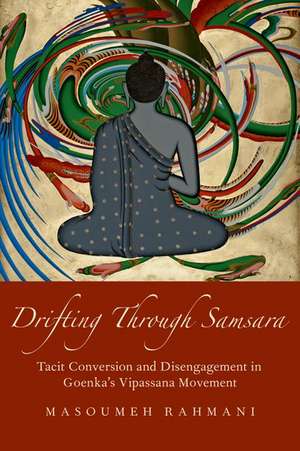Drifting through Samsara: Tacit Conversion and Disengagement in Goenka's Vipassana Movement: AAR Academy Series
Autor Masoumeh Rahmanien Limba Engleză Hardback – 30 mar 2022
Din seria AAR Academy Series
- 12%
 Preț: 190.08 lei
Preț: 190.08 lei - 27%
 Preț: 370.87 lei
Preț: 370.87 lei - 14%
 Preț: 673.94 lei
Preț: 673.94 lei - 30%
 Preț: 492.00 lei
Preț: 492.00 lei - 10%
 Preț: 438.41 lei
Preț: 438.41 lei -
 Preț: 253.06 lei
Preț: 253.06 lei -
 Preț: 386.17 lei
Preț: 386.17 lei -
 Preț: 291.86 lei
Preț: 291.86 lei -
 Preț: 264.60 lei
Preț: 264.60 lei -
 Preț: 204.08 lei
Preț: 204.08 lei -
 Preț: 214.04 lei
Preț: 214.04 lei -
 Preț: 195.94 lei
Preț: 195.94 lei -
 Preț: 153.41 lei
Preț: 153.41 lei -
 Preț: 296.49 lei
Preț: 296.49 lei -
 Preț: 220.57 lei
Preț: 220.57 lei -
 Preț: 293.81 lei
Preț: 293.81 lei -
 Preț: 222.92 lei
Preț: 222.92 lei -
 Preț: 295.11 lei
Preț: 295.11 lei -
 Preț: 290.33 lei
Preț: 290.33 lei -
 Preț: 220.57 lei
Preț: 220.57 lei -
 Preț: 203.66 lei
Preț: 203.66 lei -
 Preț: 339.09 lei
Preț: 339.09 lei -
 Preț: 353.98 lei
Preț: 353.98 lei -
 Preț: 340.41 lei
Preț: 340.41 lei - 27%
 Preț: 445.21 lei
Preț: 445.21 lei - 30%
 Preț: 552.18 lei
Preț: 552.18 lei - 14%
 Preț: 252.21 lei
Preț: 252.21 lei - 19%
 Preț: 233.26 lei
Preț: 233.26 lei - 30%
 Preț: 596.81 lei
Preț: 596.81 lei - 27%
 Preț: 687.48 lei
Preț: 687.48 lei - 30%
 Preț: 549.62 lei
Preț: 549.62 lei - 25%
 Preț: 566.78 lei
Preț: 566.78 lei - 30%
 Preț: 657.70 lei
Preț: 657.70 lei - 28%
 Preț: 424.52 lei
Preț: 424.52 lei - 31%
 Preț: 876.24 lei
Preț: 876.24 lei - 30%
 Preț: 579.27 lei
Preț: 579.27 lei - 30%
 Preț: 629.79 lei
Preț: 629.79 lei - 31%
 Preț: 861.56 lei
Preț: 861.56 lei - 30%
 Preț: 627.36 lei
Preț: 627.36 lei - 26%
 Preț: 700.31 lei
Preț: 700.31 lei - 28%
 Preț: 491.10 lei
Preț: 491.10 lei - 23%
 Preț: 199.22 lei
Preț: 199.22 lei - 28%
 Preț: 424.22 lei
Preț: 424.22 lei - 14%
 Preț: 191.75 lei
Preț: 191.75 lei - 26%
 Preț: 612.23 lei
Preț: 612.23 lei - 23%
 Preț: 339.51 lei
Preț: 339.51 lei
Preț: 436.99 lei
Preț vechi: 485.06 lei
-10% Nou
Puncte Express: 655
Preț estimativ în valută:
83.63€ • 90.81$ • 70.25£
83.63€ • 90.81$ • 70.25£
Carte disponibilă
Livrare economică 21-27 martie
Preluare comenzi: 021 569.72.76
Specificații
ISBN-13: 9780197579961
ISBN-10: 0197579965
Pagini: 264
Dimensiuni: 224 x 150 x 31 mm
Greutate: 0.48 kg
Editura: Oxford University Press
Colecția OUP USA
Seria AAR Academy Series
Locul publicării:New York, United States
ISBN-10: 0197579965
Pagini: 264
Dimensiuni: 224 x 150 x 31 mm
Greutate: 0.48 kg
Editura: Oxford University Press
Colecția OUP USA
Seria AAR Academy Series
Locul publicării:New York, United States
Recenzii
Finally a study of Buddhist mindfulness groups that does not treat meditation as self-evidential and naturally effective, but paints a much more complex picture. Less dramatic than the Buddha's enlightenment, we learn of practitioner's informal affiliation, their silent conversion, or their disengagement with meditation. Instead of following the well-trodden path of evaluating benefits of Buddhist meditation, Rahmani offers insights into practitioner's careers highly relevant for readers interested in late-modern forms of spiritual practice.
This innovative book is a welcome addition to the literature on conversion, a process whereby people change their religions and usually their lives. Rahmani's careful attention to the narratives of those who engage in and disengage from Vipassana meditation sheds light on the complex relationships between self and spirituality.
Highly innovative, brilliantly written, and based on solid research, Drifting through Samsara is one of the best books on (de)conversion that I have read in the last fifteen years. The book addresses an important lacuna in the conversion literature by theoretically expanding religious disaffiliation. Rahmani's research findings challenge the conventional religious exit literature by showing that authenticity discourse is not a motive for disengagement, but rather an effort to reconstruct an alternative universe of discourse. Tacit conversion is a great new concept to capture how many converts deny and conceal their conversion experience, and why they do that.
This innovative book is a welcome addition to the literature on conversion, a process whereby people change their religions and usually their lives. Rahmani's careful attention to the narratives of those who engage in and disengage from Vipassana meditation sheds light on the complex relationships between self and spirituality.
Highly innovative, brilliantly written, and based on solid research, Drifting through Samsara is one of the best books on (de)conversion that I have read in the last fifteen years. The book addresses an important lacuna in the conversion literature by theoretically expanding religious disaffiliation. Rahmani's research findings challenge the conventional religious exit literature by showing that authenticity discourse is not a motive for disengagement, but rather an effort to reconstruct an alternative universe of discourse. Tacit conversion is a great new concept to capture how many converts deny and conceal their conversion experience, and why they do that.
Notă biografică
Masoumeh Rahmani is a lecturer in Religious Studies at the School of Social and Cultural Studies in Victoria University of Wellington. She received her PhD from the University of Otago in 2017 and has previously held a research associate position in the Brain, Belief, and Behaviour lab at Coventry University. Her research interests include religious change, meditation movements, atheism and unbelief, and Asian spiritualities in non-Asian contexts. Her latest longitudinal project explored the diversity of "unbelief" in the mindfulness subcultures of the UK and the US and examined the influence of the practice on the worldviews of non-religious/atheist practitioners.
